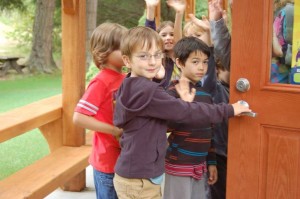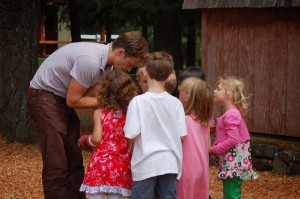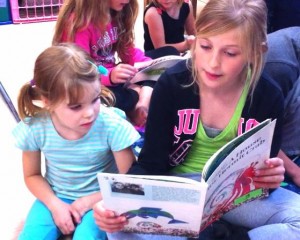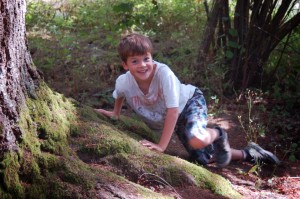Submitted by Heidi Smith for The Phoenix Rising School
 How is Phoenix Rising different from other schools, both public and private? Although many schools implement various parts of what Phoenix Rising offers, such as outdoor education, an emphasis on the arts, a mindfulness program or hands-on science, it is rare to find all of them under one roof. Add to that the fact that teachers have been intentionally provided with time to collaborate, freedom to take risks and reflect on their results, and support for creating innovative curriculum that meets the needs of students, regardless of their educational level, and the result is a unique institution, particularly for a rural area.
How is Phoenix Rising different from other schools, both public and private? Although many schools implement various parts of what Phoenix Rising offers, such as outdoor education, an emphasis on the arts, a mindfulness program or hands-on science, it is rare to find all of them under one roof. Add to that the fact that teachers have been intentionally provided with time to collaborate, freedom to take risks and reflect on their results, and support for creating innovative curriculum that meets the needs of students, regardless of their educational level, and the result is a unique institution, particularly for a rural area.
This year, the schedule has been arranged to allow six hours per week, almost fifteen percent, for curriculum creation and collaboration, with the intent that when staff members are inspired and supported, the results will inevitably appear in the students. Already, learning has become more integrated, relevant and engaging through the practice of thematic units and project-based assessment.
In a move that was pioneered at the end of the 2012/13 school year, all content is now taught through six-week theme-based units. “The topics are interesting and relevant to the students,” says Education Director Nick Gillon. “They’re selected by the teacher but selected also collaboratively with the students.” The teaching staff has appreciated the switch. “With themes, I can use things that are out in the world that are enriching and I don’t have to try to squeeze them in around an already structured curriculum,” says first and second grade teacher Melody Rae. “I find that very helpful.” Megan Moskwa, third and fourth grade teacher, agrees. “It’s really easy to relate the units to their everyday life,” she says.
The themes also allow core classroom teachers to collaborate effectively with specialty teachers in art, science, outdoor education and mindful awareness. “It’s very helpful in terms of integrating with

the specialty teachers,” says fifth and sixth grade teacher Sophie Sykes. “It has come together right from the beginning of the year.” Her first theme is The Hero’s Journey, and as an example, her students spent their time in Jeannie Isaacs’ art class creating posters titled ‘I am My Own Hero.’ In science, they will be studying heroes of science.
Another helpful aspect of them-based learning is that it naturally lends itself to student-directed inquiry. “We’re starting with questions, not answers,” says Gillon. “Instead of the teacher standing and saying, ‘Here’s what I know about taking care of me, get your notebook ready,’ it’s more about, ‘What do you know about taking care of you? What questions do you still have? Who might have those answers? What experts might we interview? What fieldtrips might we take? What quests on the web could we do?’ So that’s a collaborative guided inquiry, where the teacher is teaching both the content and inquiry skills.” Moskwa explains, “The idea is for them to kind of take charge and do their own research eventually – to pick up a book and say, ‘This is what I want to learn about and focus on.’ That’s the eventual goal.
In addition to themes, teachers have also moved into project-based learning and assessment. Last year for the final unit of the year each student created their own book, filled with their completed writings, drawings and demonstrations of knowledge. This year, “Basically, we’re continuing that process and the teachers are even better at it,” says Gillon. “Your book doesn’t have to be a book. We could have a CD. If they’ve had a process of making a sculpture or making a play, then photos of that could be put in there, audio recordings of interviews with experts, that kind of thing.” Moskwa has already planned her culminating project for the ‘taking care of me’ unit. “ I took them out to the garden and got them excited about it,” she says. “We’re ending with them planning a menu and then preparing a meal and their parents coming and partaking of that. The menu will include the nutritional value of all the different foods – I hope.”
 The projects are part of an assessment strategy that meets the common core standards without losing student interest and engagement. “We’re not throwing out the core competencies,” says Gillon. We’re throwing out hours of testing in front of the computer to make sure you’ve got it.”
The projects are part of an assessment strategy that meets the common core standards without losing student interest and engagement. “We’re not throwing out the core competencies,” says Gillon. We’re throwing out hours of testing in front of the computer to make sure you’ve got it.”
Teachers have noticed that this approach to the curriculum makes it easier to differentiate instruction to meet students at different levels. “I’m not stuck with a basal reader or something that the children all have to read at the same time,” says Rae. “I’m able to get them the reading materials or the math materials that they need for where they are and every child is working at their own level. I can also push them onto the next level.” Moskwa has found that, “Anything can be differentiated. Even with the daily math activities I’m doing, every math game we play can be played in five different ways.”
A final piece of the program this year is an unusually high degree of curriculum/staff support for such a small school. Gillon, who is in the process of earning his P.hD. at the University of Washington in Educational Psychology, is trained in ‘coding’ classes according to specific aspects of effective teaching. “What we’re trying to do is look to what a lot of universities are going to now for teacher education, which is a collaborative coaching role,” he says. “You have an instructional coach who doesn’t necessarily position him or herself as a more expert instructor but rather an extra set of eyes to sit and watch lessons happens, to videotape them and watch them like game films.” These videos are for teachers instructional coaching specifically to be used privately by Gillon and the teacher.
coaching specifically to be used privately by Gillon and the teacher.
Although the videotaping has not yet started, the staff has found Gillon’s role valuable. “It gets me thinking out of my traditional teacher box and helps me to start thinking about different ways of bringing in learning,” says Rae. “I’ll start to have an idea and I’m not quite sure where to go with it. He’ll just see a little snippet of that and he’s like Emeril Lagassi. “Just add a little of this! Bam!” He spices it up and gives you an idea. You don’t have to go with it, but sometimes even his idea will spark another idea for me.” “It’s wonderful,” says Moskwa. “Any time I run a question by, even if he doesn’t have an answer right then, he’ll leave a note on my desk.”
With all of these structures in place, both students are receiving an unprecedented level of support and attention that is unusual in a school of any size, but especially in a small rural one like Phoenix Rising. Add the beautiful new campus to the equation, and a new day has clearly dawned. We are expecting great things as a result. Stay tuned!




















































